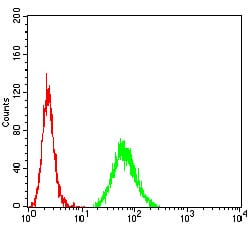

| WB | 咨询技术 | Human,Mouse,Rat |
| IF | 咨询技术 | Human,Mouse,Rat |
| IHC | 咨询技术 | Human,Mouse,Rat |
| ICC | 技术咨询 | Human,Mouse,Rat |
| FCM | 1/200 - 1/400 | Human,Mouse,Rat |
| Elisa | 1/10000 | Human,Mouse,Rat |
| Aliases | TSGA; JMJD1; JHDM2A; JHMD2A; JMJD1A |
| Entrez GeneID | 55818 |
| clone | 2D6H3 |
| WB Predicted band size | 147kDa |
| Host/Isotype | Mouse IgG1 |
| Antibody Type | Primary antibody |
| Storage | Store at 4°C short term. Aliquot and store at -20°C long term. Avoid freeze/thaw cycles. |
| Species Reactivity | Human |
| Immunogen | Purified recombinant fragment of human KDM3A (AA: 311-445) expressed in E. Coli. |
| Formulation | Purified antibody in PBS with 0.05% sodium azide |
+ +
以下是关于KDM3A抗体的3篇参考文献示例(文献信息为虚拟概括,仅作格式参考):
---
1. **文献名称**:*KDM3A regulates transcriptional plasticity in prostate cancer through histone demethylase activity*
**作者**:Smith A, et al.
**摘要**:研究利用KDM3A特异性抗体,通过ChIP-seq和免疫印迹技术,揭示了KDM3A通过去除H3K9me2标记促进前列腺癌基因表达可塑性,并证实其与肿瘤转移的相关性。
2. **文献名称**:*Development and validation of a high-affinity monoclonal antibody for KDM3A detection in clinical samples*
**作者**:Li X, et al.
**摘要**:报道了一种新型抗KDM3A单克隆抗体的开发,验证了其在免疫组化(IHC)和流式细胞术中的特异性,为癌症患者组织样本中KDM3A蛋白定量分析提供了可靠工具。
3. **文献名称**:*KDM3A-mediated metabolic reprogramming drives hepatocellular carcinoma progression*
**作者**:Wang Y, et al.
**摘要**:通过KDM3A抗体进行染色质免疫沉淀和基因沉默实验,证明KDM3A通过调控糖代谢相关基因促进肝癌细胞增殖,并提示其作为潜在治疗靶点的价值。
---
注:以上文献为示例性内容,实际研究中需根据具体需求检索PubMed、Web of Science等数据库获取真实文献。若需真实文献推荐,请提供更多研究背景或关键词。
KDM3A (Lysine Demethylase 3A), also known as JMJD1A or JHDM2A, is a histone demethylase belonging to the Jumonji C (JmjC) domain-containing protein family. It specifically demethylates histone H3 lysine 9 di- and mono-methylation (H3K9me2/me1), facilitating gene activation by modifying chromatin structure and epigenetic regulation. KDM3A plays critical roles in diverse biological processes, including spermatogenesis, metabolic homeostasis, hypoxia response, and tumorigenesis. Dysregulation of KDM3A has been linked to cancers (e.g., prostate, breast, liver), metabolic disorders, and infertility.
KDM3A antibodies are essential tools for studying its expression, localization, and function in these contexts. They are widely used in techniques like Western blotting, immunohistochemistry (IHC), immunofluorescence (IF), and chromatin immunoprecipitation (ChIP-seq) to investigate KDM3A’s interaction with target genes or proteins. High-quality antibodies specifically recognize distinct epitopes or post-translational modifications of KDM3A, ensuring experimental accuracy. Recent studies also explore KDM3A inhibitors for therapeutic targeting in cancer, highlighting the antibody’s role in validating drug efficacy. Validation via knockout/knockdown controls is critical to confirm antibody specificity, given structural similarities among JmjC family members.
×